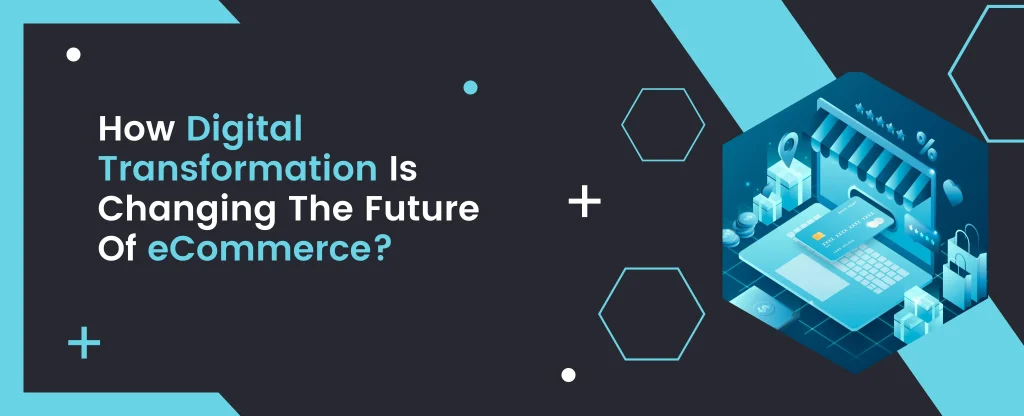How Digital Transformation Is Changing The Future Of eCommerce?
14 Dec 23 


Does digital transformation play any role in changing the future of eCommerce?
Many consumers were unwilling to use eCommerce apps when they were initially developed because they were unable to physically experience the goods they were purchasing. They had to navigate through a drawn-out, time-consuming online payment procedure and submit their payment beforehand. Now that the future of eCommerce has undergone a significant and permanent digital transformation, it provides faster checkout times and safer online transactions.
The term “digital transformation” is no longer novel. While digital transformation was already occurring earlier in many industries, a global epidemic quickened the pace of change. The COVID-19 pandemic completely disrupted business operations. As businesses struggle to survive, unpredictability about the state of the global economy persists and has an impact. Strategies for digital transformation have accelerated due to the need to move quickly.
In general, digital transformation is the most recent of many changes centered around technology. It is altering how companies interact with their clients and carry out their operations. It involves modernizing every aspect of a company and introducing innovative technologies. So, lets dive into the future of ecommerce and how digital transformation impacts it.
eCommerce with Digital Transformation
Adopting digital tools and procedures in your company to accomplish strategic business objectives is known as digital transformation. This complex process has the power to significantly alter the internal dynamics and culture of the company. The digital wave is not restricted to the eCommerce sector.
Advances in digital transformation have contributed to a decrease in the significance of distance, be it cultural or geographical. This has made it easier to search for goods, match customer preferences with products, and confirm credibility and quality. This relationship is the reason e-commerce apps have become more significant in the lives of consumers.
By 2023, digitally transformed businesses are expected to represent $53.3 trillion of the nominal GDP of the world. This demonstrates unequivocally how important digital transformation is to the world economy. While automation helps to increase efficiencies in processes, digital transformation is positively influencing the creation of enhanced client experiences.
Stated differently, businesses that are keeping up with the digital revolution will undoubtedly make greater economic contributions. Therefore, the change management process adopted within the companies has a huge impact on determining the overall effectiveness of the digital transformation strategies.
Role of Digital Transformation on eCommerce
The e-commerce industry has experienced a significant shift in the last few years due to technological breakthroughs, shifting consumer preferences, and convenience-driven demands. The future of eCommerce has a drastic change from the digital transformation strategies adopted. Companies need to change to survive in the dynamic e-commerce environment as online interactions continue to influence how we shop.
1. Effective Payment Solutions
The eCommerce market is increasing at an uncertain rate, and quick, safe, and efficient payment methods are crucial. Research indicates that roughly 69% of shopping carts on e-commerce platforms are abandoned by users. One reason for this is the convoluted and time-consuming payment process. The payment process can be made interesting and easier with the integration of a customized loyalty program as well.
Therefore, a payment process needs to be quick and simple on an e-commerce platform. You can have a payment gateway integration to have better payment options. Similarly, after the pandemic surged, people transformed more into contactless payment options. Additionally, digital wallet mobile apps have also emerged as a trend of digital transformation.
Payment methods are typically region-specific; for example, credit card transactions are common in the US and Canada, while debit cards and digital funds are more common in Europe. Even though developing nations still rely heavily on cash, they are quickly moving towards digitalization.
2. Better Supply Chain Management
Through the use of automation and analytics, the eCommerce revolution has allowed businesses to optimize their supply chain management.
For instance, companies can expedite the order fulfillment procedure by utilizing automated order processing systems and automated inventory management systems to monitor inventory levels instantly.
Another technology that’s helping eCommerce supply chain management is the Internet of Things (IoT). Businesses can track goods and shipments in real time through the Internet of Things, which speeds up and boosts the effectiveness of the supply chain.
3. Omnichannel Existence
An omnichannel existence is now possible for eCommerce applications because of digital transformation. This implies that companies can now connect their offline and online channels, as well as connect clients through a variety of platforms like social media, mobile apps, and web pages. For instance, companies may offer online shoppers an easier way to shop by allowing store-based pickup and returns.
Additionally, voice-activated assistants in the eCommerce space, such as Google Assistant and Amazon Alexa, are highly prevalent. Due to digital transformation, companies can now create voice-enabled apps that allow users to shop online with voice commands. Doing this will not only enhance the user experience but also help the customers move through the DTC funnels even faster.
4. Improved Client Connection
The way consumers engage with eCommerce apps has evolved due to digital transformation. The latest technologies, like artificial intelligence, ML, and chatbots, have made it possible for consumers to have greater interest and tailored interactions.
To tailor product recommendations, advertisements, and communication strategies, for instance, companies can leverage data analytics to comprehend consumer actions and habits. Online retailer’s are able to tailor their internet presence for mobile devices through digital transformation. This improves the whole buying process for customers by making it simple for them to explore and make transactions using their smartphones or tablets.
5. Strong Marketing Social Media
Social media has made the relationship between e-commerce platforms and their clientele closer than ever. Customers can inspect online goods by looking at pictures on social media sites like Instagram, Facebook, and Twitter. When you manage social media accounts you can also feature links that can be clicked to access e-commerce platforms.
Clients can also use the company profiles of different products to read feedback and assess the advantages and disadvantages of the product, enabling them to make a better-informed purchase decision.
6. Continuous Sales and Market Visibility
Mobile gadgets are becoming increasingly important to businesses on a regular basis due to their growing popularity. Over 90% of the customers of mobile devices, according to research, consistently maintain them within reach.
Thus, focusing on these mobile devices opens up opportunities for the e-commerce sector to expand. The advancement of quicker internet connections has led to unprecedented levels of digital expertise, and the worldwide mobile e-commerce market is inevitable.
Consumers can shop with convenience at any time and from any location. Digital transformation has made it possible for e-commerce platforms to have revenues and a market presence around-the-clock.
7. AR and VR
Virtual reality (VR) and augmented reality (AR) technologies are revolutionizing how customers engage with products on the internet. Virtual showrooms, dynamic product demos, and online testing experiences are made possible by these immersive technologies.
Brands can close the gap between online and offline shopping by enabling customers to see and feel products before making a purchase. Adopting AR and VR can give businesses a competitive edge in online shopping, increase customer satisfaction, and lower return rates.
8. Sustainability and Ethical Shopping
When deciding about what to buy, customers are becoming more conscious of environmental issues and ethical practices. Companies can draw in an increasing number of environmentally conscious customers by implementing sustainable programs, using sustainable packaging, and showcasing ethical purchasing and manufacturing practices. In e-commerce, placing a strong emphasis on sustainability and moral principles can increase customer loyalty, set companies apart from rivals, and improve the future.
9. Demand-Based Prediction
One of the most intriguing ways that technological advancement has affected the world’s e-commerce industry is with anticipated shipping. This is a novel strategy in which the online retailer anticipates the items that its consumers will want to buy according to their past purchases and arranges for the goods to be provided to the closest logistics partner ahead of time.
Therefore, anticipatory shipping helps the e-commerce store and its clients save a great deal of work and time. Predicting demand aids in inventory management for the store and guarantees that there remains enough inventory on hand to meet demand from the market.
10. Voice Commerce and Smart Devices
Voice commerce has expanded as a result of the popularity of voice assistants like Apple’s Siri, Google Assistant, and Amazon’s Alexa. Voice-activated gadgets are finding their way into more and more homes, where users are using them for everything from ordering to researching products.
Additionally, you will have AI-powered tools, which are helpful in getting your doubts cleared through a virtual interface. To appeal to this expanding market, companies need to make their e-commerce platforms voice search-friendly and allow voice-based transactions. Comfort, independent communication, and a seamless shopping experience are provided by voice commerce.
Wrapping Up
The future of ecommerce faces thrilling opportunities and challenges. To succeed in the future of e-commerce, businesses must embrace digital transformation and customer-first approaches. Understanding customer needs, providing outstanding experiences, and continuously adjusting to new eComerce app development trends are crucial. Together, let’s mold the e-commerce industry’s future and open up fresh opportunities for growth.
At Mindster, we are aware that every business and industry will experience digital transformation differently and that it is a continuous process. We are a top-rated mobile app development company committed to helping you become successful in the future and have a wealth of experience working with businesses in the production, healthcare, industrial, chemical, and automotive industries. Our UI/UX design team is experienced and adept at crafting top-rated mobile app solutions that enhance the user experience.
- Android Development3
- Artificial Intelligence16
- Classified App1
- Digital Transformation7
- Doctor Appointment Booking App10
- Dropshipping1
- Ecommerce Apps26
- Education Apps2
- Fintech-Apps30
- Flutter2
- Flutter Apps19
- Food Delivery App5
- Grocery App Development1
- Grocery Apps3
- Health Care4
- IoT2
- Loyalty Programs8
- Microsoft1
- Mobile App Maintenance1
- Mobile Apps116
- Product Engineering2
- Progressive Web Apps1
- Saas Application2
- Shopify3
- Software Development1
- Taxi Booking Apps7
- Truck Booking App5
- UI UX Design8
- Uncategorized2



















Comments